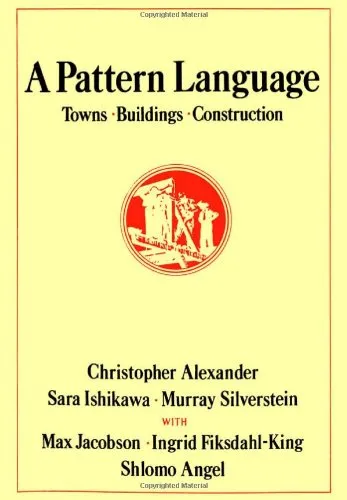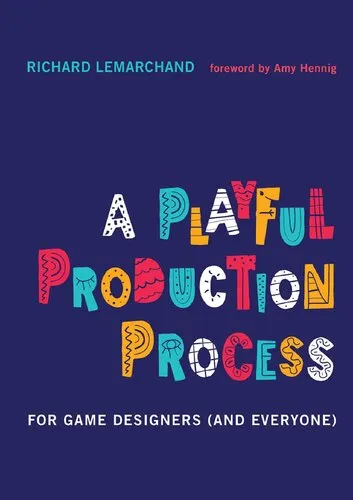A Pattern Language: Towns, Buildings, Construction (Cess Center for Environmental)
4.7
بر اساس نظر کاربران

شما میتونید سوالاتتون در باره کتاب رو از هوش مصنوعیش بعد از ورود بپرسید
هر دانلود یا پرسش از هوش مصنوعی 2 امتیاز لازم دارد، برای بدست آوردن امتیاز رایگان، به صفحه ی راهنمای امتیازات سر بزنید و یک سری کار ارزشمند انجام بدینکتاب های مرتبط:
معرفی کتاب A Pattern Language: Towns, Buildings, Construction به زبان فارسی
خلاصهای جامع از کتاب
کتاب A Pattern Language نوشتۀ کریستوفر الکساندر و همکارانش، یکی از شاهکارهای ماندگار در عرصۀ طراحی شهری و معماری به شمار میرود. این کتاب که در سال ۱۹۷۷ منتشر شد، با ارائۀ الگوهای قابلفهم و جامع در زمینۀ طراحی شهری، ساخت بناها و روابط اجتماعی، همواره به عنوان مرجع مهمی در معماری و برنامهریزی شهری تلقی میشود. نویسندگان در این کتاب سعی دارند تا زبانی مشترک از الگوها و اصول طراحی محیط انسانساخت را در قالب ۲۵۳ الگو ارائه دهند. هر الگو، راه حلهایی را برای مشکلات خاص طراحی ارائه مینماید و این امکان را فراهم میآورد تا طراحی قابلیت سازگاری با نیازهای بشری و محیط زیست را داشته باشد.
نکات کلیدی
- به کارگیری الگوها: مهمترین نقطه قوت کتاب، روش سازماندهی و استفاده از الگوها برای حل مسائل در سطوح مختلف طراحی است؛ از طراحی شهری بزرگ تا جزئیات یک ساختمان.
- رویکرد انسانی: هر الگو به گونهای طراحی شده است که نه تنها به نیازهای فیزیکی، بلکه به نیازهای اجتماعی و روانی انسانها پاسخ دهد.
- قابلیت تلفیق: الگوها به گونهای طراحی شدهاند که میتوانند با یکدیگر تلفیق شوند تا راهحلهای جامعی ارائه دهند که نه تنها کاربردی، بلکه زیبا و ماندگار نیز باشند.
جملات معروف از کتاب
"هر بار که ساختاری در جهان ایجاد میشود، به نحوی هستیبخش است و باید به زندگی جان بدهد."
"تنها با شناخت الگوهای واقعی است که میتوانیم سازههایی بسازیم که با انسان و محیط تطابق داشته باشند."
اهمیت کتاب
اهمیت A Pattern Language از آنجاست که این کتاب به عنوان پلی میان نظریه و عمل در حوزههای مهندسی معماری و طراحی شهری عمل میکند. با ارائۀ زبانی برای ارتباط بین طراحی محیط ساخته شده و نیازهای انسانی، این اثر مسیرهای جدیدی برای ایجاد فضاهایی گشود که زیبا، کارآمد و پایدار باشند. همچنین، این کتاب با الهامبخشی به معماران و برنامهریزان شهری، افزایش تعامل میان انسان و محیط زیست را تشویق میکند.
Introduction to "A Pattern Language: Towns, Buildings, Construction"
Written by Christopher Alexander, Sara Ishikawa, and Murray Silverstein, "A Pattern Language" is a groundbreaking work that has significantly influenced the way we think about architecture and urban design. The book is part of a larger series by the Center for Environmental Structure, which aims to articulate a comprehensive method for designing and building environments that are both beautiful and functional.
Detailed Summary of the Book
Published in 1977, "A Pattern Language" introduces a novel approach to architectural design by presenting a collection of 253 patterns that can be used to create diverse, wholesome, and harmonious spaces. These patterns are arranged in a hierarchical structure, starting from the most macro level, focusing on regional planning and urban design, and moving down to the micro, focusing on individual buildings and their internal layouts.
Each pattern describes a specific, recurring problem in the environment and proposes a core solution to that problem. By adopting these patterns, architects and city planners can combine them in various ways to address the unique needs and challenges of each project. The beauty of this pattern language lies in its adaptability, allowing for infinite creativity while ensuring that the resulting environments promote human well-being.
Key Takeaways
- Emphasis on Human-Centric Design: The book advocates for spaces that cater to human needs and enhance our quality of life.
- Interconnectedness of Patterns: Although each pattern can stand alone, they can also be combined to complement each other, creating a cohesive design language.
- Universal Applicability: The patterns can be applied across different contexts, transcending cultural and geographical boundaries.
- Empowerment of Individuals: The book offers individuals the tools to actively participate in designing their environments, encouraging a democratic approach to architecture.
Famous Quotes from the Book
"The elements of this language are entities called patterns. Each pattern describes a problem which occurs over and over again in our environment, and then describes the core of the solution to that problem, in such a way that you can use this solution a million times over, without ever doing it the same way twice."
"No pattern is an isolated entity. Each pattern can exist in the world, only to the extent that is supported by other patterns."
Why This Book Matters
"A Pattern Language" is seminal in its approach to harmonizing human needs with built environments. It has inspired generations of architects, designers, and urban planners to rethink how spaces can shape daily life. The book’s innovative methodology transcends time, remaining relevant in today’s rapidly evolving world where the integration of technology and sustainable practices is crucial. Its influence extends beyond the field of architecture, impacting software design, organizational theory, and social sciences, cementing its status as a timeless masterpiece in understanding and creating human environments.
دانلود رایگان مستقیم
شما میتونید سوالاتتون در باره کتاب رو از هوش مصنوعیش بعد از ورود بپرسید
دسترسی به کتابها از طریق پلتفرمهای قانونی و کتابخانههای عمومی نه تنها از حقوق نویسندگان و ناشران حمایت میکند، بلکه به پایداری فرهنگ کتابخوانی نیز کمک میرساند. پیش از دانلود، لحظهای به بررسی این گزینهها فکر کنید.
این کتاب رو در پلتفرم های دیگه ببینید
WorldCat به شما کمک میکنه تا کتاب ها رو در کتابخانه های سراسر دنیا پیدا کنید
امتیازها، نظرات تخصصی و صحبت ها درباره کتاب را در Goodreads ببینید
کتابهای کمیاب یا دست دوم را در AbeBooks پیدا کنید و بخرید
1395
بازدید4.7
امتیاز0
نظر98%
رضایتنظرات:
4.7
بر اساس 0 نظر کاربران
Questions & Answers
Ask questions about this book or help others by answering
No questions yet. Be the first to ask!














